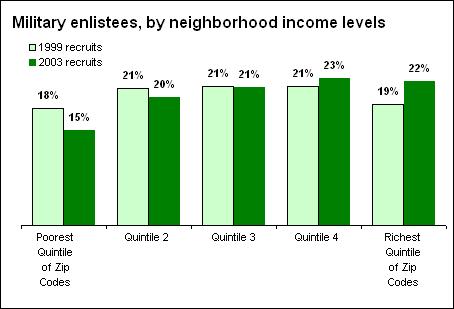Interesting Demographic Data on the Army
Its always interesting when someone successfully challenges a widely-held assumption. Like much of America, I have always accepted the notion that the all-volunteer army attracted a disproportionate number of poorer enlistees. This made sense, since a large part of the recruiting message is one of education and opportunity, which should be powerful inducements to folks trying to get themselves out of poverty. A few have argued that this is not true, that messages of duty, honor, and country resonate with all classes, but we have all been trained of late by the cynical media that those are dated and powerless concepts. The main difference in perception about army demographics has been between those who thought the perceived demographic skew was bad and those who thought it just was. A number folks of late have actually supported a draft due to this perception of a demographic bias.
So it was interesting to see this study by Tim Kane, as unearthed by Mark Tapscott, that tends to explode this myth. Not having family income data for army enlistees, the study chose as a reasonable proxy the relative wealth of their home zip code. Based on this methodology, we find that the all-volunteer army actually skews rich rather than poor:
As with all studies like this, I caveat that I have not seen their methodology, etc. etc. However, it is interesting in that it is completely opposite of public perception. Since I didn't really find anything horrible about the old perceived skew, this study doesn't change any of my opinions on the army or the draft, but it will be interesting to see if Charlie Rangel reverses course and starts criticizing the army for being a rich kid's boondoggle.

I think there's an underlying belief that rich people are smarter than poor folks, and as such only poor people would actually volunteer for the army.
Just like many people are surprised to learn that rich people overwhelmingly supported the Viet Nam war. Over the years, supporting Viet Nam has become the "wrong position," and it surprises people to learn that *rich* people supported that.
Playing off Max's comment in a way that he perhaps did not intend, assuming a correlation between income and intelligence (which I do assume), the army's increased intelligence standards for volunteers should have the effect of selecting for greater income.
A friend of the family, born, raised and still living in Harlem is also in the Army Reserve and often does recruiting, and he says they don't even bother recruiting in Harlem anymore, because they're not getting the education (note to potential flamers, I said "education" not "intelligence" level) that today's Army needs.
You're right, that's not what I meant, but it is an interesting point.
I was simply remembering something I read in "Lies My Teacher Told Me" where Americans were told the overall support/lack of support for Viet Nam in one year, and asked to break down the support in the broad "rich" and "poor" categories. They were also told that if one of those categories had more support for the war than the average, then the other category would need to have less support.
And, of course, most respondents assumed the poor supported Viet Nam, and the rich did not. Why? Because today we think that not supporting the war was "right," and we assume the rich would make that choice. When we learn that the rich supported Viet Nam, we can figure out why (i.e., opposition to communism), but it's kinda strange.
Same book referred to a "study" some students did that involved driving around town in a cheap car and a luxury car, and not moving when the light turned green until somebody honked. People routinely waited five seconds longer to honk at the luxury car. Hmm.
I'm not saying that the rich are smart, although it does seem that smarter people have a better chance of becoming rich (http://esr.ibiblio.org/?p=129). I'm saying that people tend to assume that the rich are smarter.
This poll was done by the Heritage Foundation... that's really all you need to know.